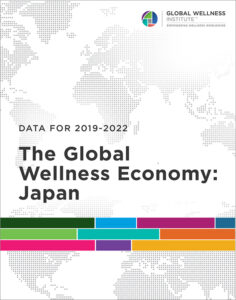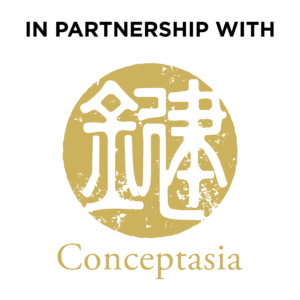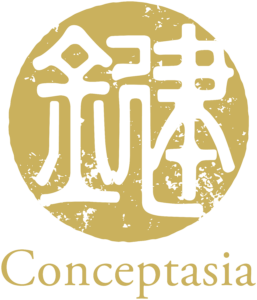
IN PARTNERSHIP WITH Conceptasia and Fukui Wellness Collaboration
Living Well in JAPAN
Japan is steeped in rich wellness traditions enhanced by a natural environment that encourages living well in its many forms. The vast majority of the country is comprised of mountains and forests, encouraging outdoor activities like hiking and mushroom foraging. Since Japan is surrounded by the ocean, there is ample access to beaches and water activities are plentiful. Moreover, Japan’s ancient wellness traditions remain strong today, such as its Onsen culture (natural hot springs that are a quintessential part of wellness), a country-wide respect for hygienic living and cleanliness, engrained attitudes towards healthy food and a Zen mindset that influences activities from mindfulness to martial arts.
When the Japanese government coined the term “Forest Bathing” in the early 1980s (a translation of “shinrin-yoku” or taking in the forest), the world rediscovered Japan’s vast wellness resources and its Zen philosophy towards living. Ceremonies like Kado (flower arrangement) and Sado (tea ceremony) originate from Zen and visitors are encouraged to take a step back and appreciate both the moment and the act itself. The concept of what makes a life worth living – ikigai – along with a lifestyle of healthy eating, natural physical activity and social connections, have been credited for the longevity of the centenarians in Japan’s Blue Zone.
JAPAN KEY FACTS
![]() Population
Population
124,516,650 (2023)
Life Expectancy for Men
81.1 years (2022)
Life Expectancy for Women
87.1 years (2022)
Example Modalities
Forest Bathing (“shinrin-yoku”)
Onsen Culture
Zen Mindset
Learn more about this partnership:
Read press release

JAPAN WELLNESS ECONOMY REPORT
This country report is the first detailed measurement of the size of Japan’s wellness economy, presenting data on its eleven wellness sectors. The report shows the trajectory of the wellness economy from 2019 to 2022, and subsector details where data are available. It also contains global and regional comparisons to show where Japan stands vis-à-vis its peers and competitors. This report and its data will be valuable for any businesses and investors who are interested in the opportunities and potential offered by Japan’s dynamic wellness market.
WELLNESS ECONOMY BY SECTOR IN JAPAN
The wellness economy, as defined by GWI, is broad and diverse. Its eleven sectors encompass many different types of consumer activities and expenditures, including products, services, travel, and technology. Every country’s wellness economy is unique. Its composition can vary widely from country to country, based on its development history, culture, socioeconomic conditions, and government policy. Below we present Japan’s top-line wellness economy data and how it ranks globally.
2022 Japan Rankings out of 218 countries
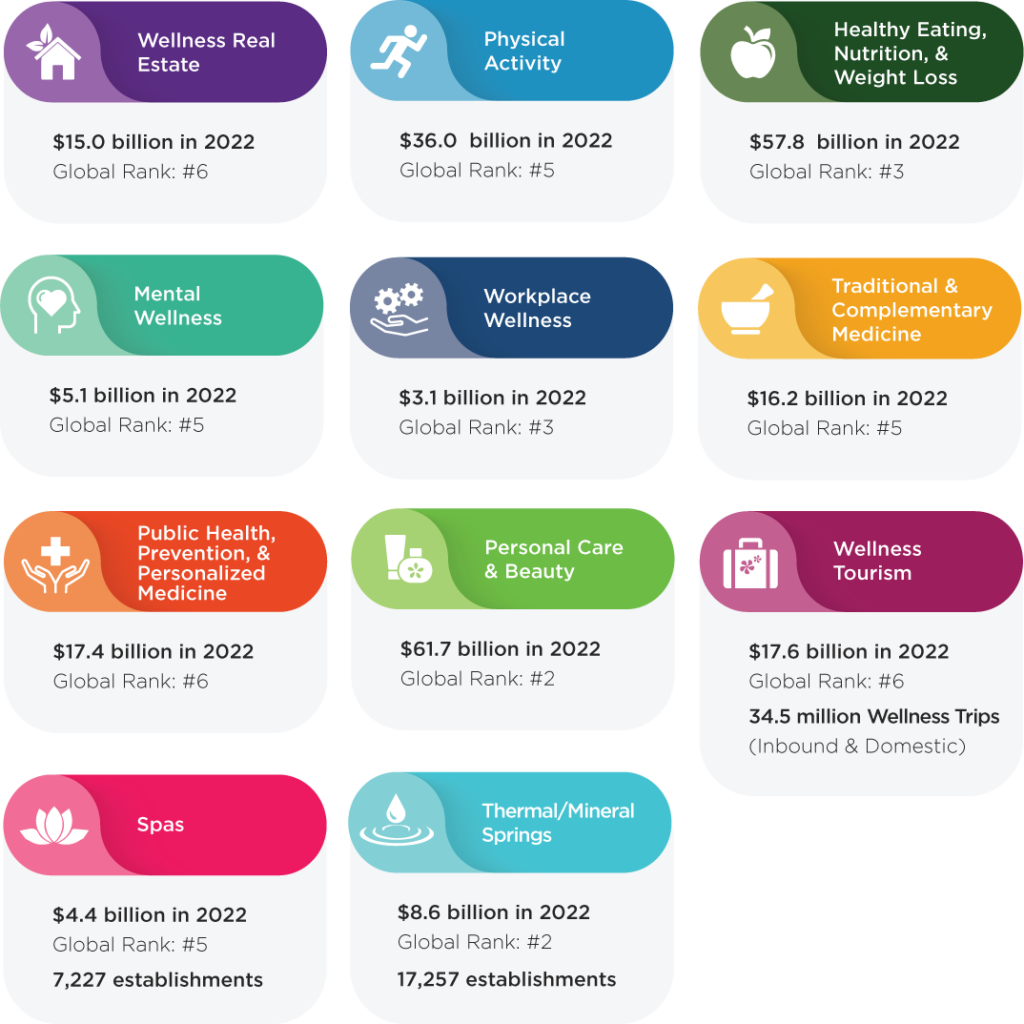
KEY WELLNESS EXPERIENCES IN JAPAN
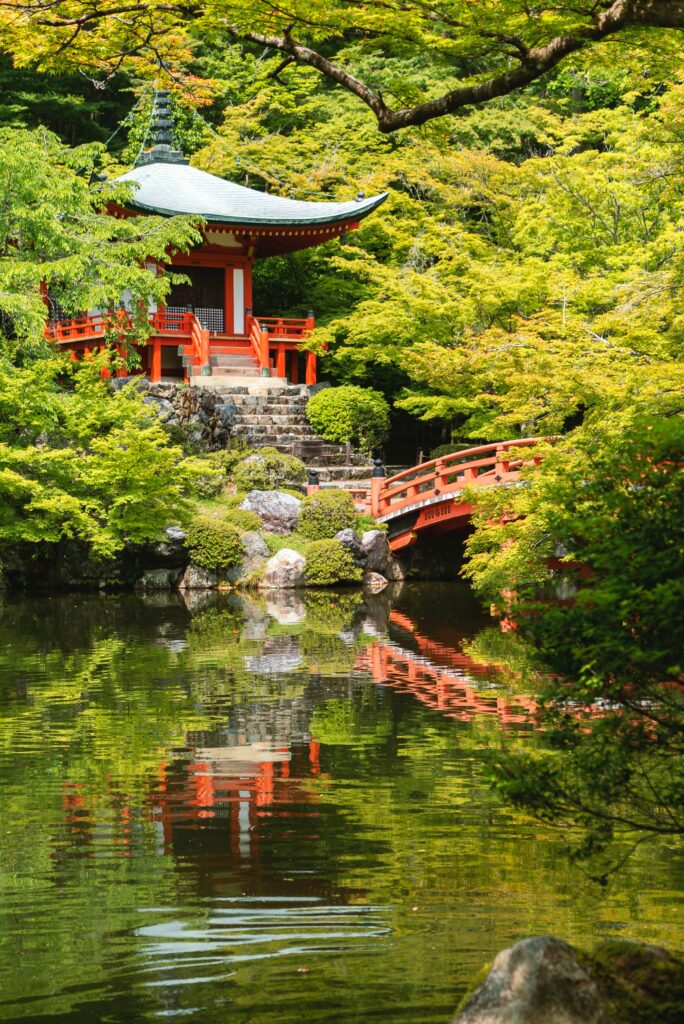
Japan is recognized as a country whose culture defines wellness, from nature-based travel to fresh, unmodified food eaten with mindfulness and appreciation. Even Japan’s “fast food” is different from most other countries and many chains serve nutrient-dense, healthy meals for those who don’t have time to cook. Most restaurants, from five-star establishments to local “finds,” serve fresh fish, meat and vegetables, making every meal a wellness experience. For the plant-based inclined, there is Shojin Ryori, a vegan cuisine based on the diet of Buddhist monks dating to the sixth century, which incorporates soybean-based foods and seasonal vegetables, wild mountain plants and nuts. Employing two “rules of five”: five colors (green, red, yellow, black and white) and five flavors (sweet, sour, salty, umami and bitter), it encourages contemplation and appreciation, while promoting balance of the body, mind and spirit.
The country’s Onsen’s, natural hot springs that have minerals such as iron, sulphur and calcium that are said to provide health benefits, are also a well-known part of Japan’s wellness culture — and are where the tradition of bathing daily originated. J-Beauty is well-established with internationally renowned and innovative companies that leverage Japan’s beauty traditions and the latest technology to create products that emphasize natural, functional, nontoxic, sustainable ingredients, for better skin, sun protection and anti-aging. Japan also cultivated Zen as a philosophy of living, making the country the ultimate destination to experience mindfulness.
Whether visitors to Japan stay at a luxury spa resort or a traditional country inn, they will appreciate the true meaning of health in a country dedicated to helping people adopt wellness (and happiness!) into their way of life.
“The traditions of Japan heavily inspire our wellness culture today – from Onsen bathing and the appreciation of nature, including activities like forest bathing and hiking/trekking, to our nation’s general culture of cleanliness, attitudes towards healthful food, and a focus on martial arts based firmly in the Zen mindset.”
– Yoriko Soma, CEO of Conceptasia
OTHER GWI RESOURCES & REPORTS FOR JAPAN
PROVIDED IN PARTNERSHIP WITH Conceptasia and Fukui Wellness Collaboration
The Global Wellness Institute is grateful to Conceptasia for supporting the development of this country report and making its important Japan-specific data available to the world.
Conceptasia was formed over two decades ago to consult with spa and hotel brands to develop and launch wellness offerings within the Asian market. The company has offices in Tokyo and Singapore and was founded by Yoriko Soma and Suzanne Ng.
Fukui Wellness Collaboration is an organization focused on developing wellness tourism offerings in the Fukui Prefecture region, including Eiheiji City, where the sacred Temple of Eternal Peace is located. Visit the Fukui Website. Visit the Conceptasia Website.

